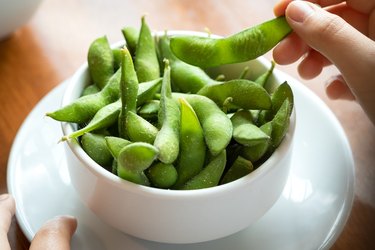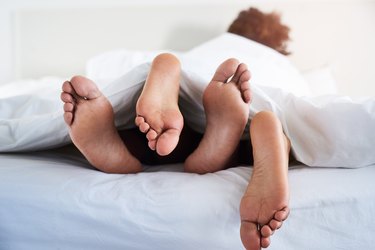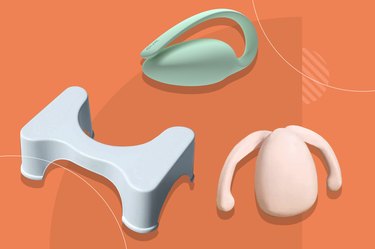
Menopause, or the permanent end of your menstrual cycle, may look a little different for everyone, but one thing is for sure: It's a time of many changes, some of which may be more welcome than others. And it all has to do with hormonal changes.
During your younger years, hormone levels — particularly estrogen, progesterone and testosterone — are high, explains Barbara Hannah, MD, an ob-gyn in the Detroit area and author of A Hot Mess: Tips, Tricks and Truths About Menopause and Perimenopause. These hormones are needed for menstruation, childbearing and childbirth, but their levels naturally shift once menopause sets in.
Video of the Day
Video of the Day
"During the aging process, there is a significant decline in hormone production, and as a result there are a number of changes in the body," Dr. Hannah explains. "These changes occur from the top of the head to the bottom of the feet and not one single body system is spared."
We often hear about less-than-pleasant side effects like hot flashes, mood changes and sleep problems like night sweats, but another symptom that may catch you off guard is painful intercourse after menopause. Here's why it happens and how to cope.
What Causes Painful Sex After Menopause?
Menopause can come with various unsavory symptoms and side effects, Dr. Hannah says. One of the most aggravating symptoms is often vaginal atrophy, or the thinning, drying and inflammation of the vaginal walls as a result of a decrease in estrogen production, according to the Cleveland Clinic.
"During youth, the hormone estrogen is responsible for keeping the vagina moist and lubricated during sexual intercourse," Dr. Hannah explains. "The youthful vagina has folds called rugae that help to add pleasure to the sexual experience, and the thicker vaginal skin is resistant to damage and tearing."
With aging and the decrease in estrogen, the vagina thins and dries, which leads to frequent infections, tearing of the tissue and, unsurprisingly, painful intercourse, which can make having sex almost impossible for some people, Dr. Hannah says. Additionally, the vagina becomes shorter and narrower with the decrease in the hormone estrogen.
"Upwards of 90 percent of women experience painful intercourse due to vaginal dryness, making it one of the most common menopausal symptoms," Dr. Hannah says.
6 Remedies for Painful Intercourse After Menopause

1. Moisturizers
According to Dr. Hannah, a vaginal moisturizer is one of the most effective non-hormonal options that can potentially help with vaginal dryness contributing to painful sex.
These are typically available over-the-counter; she recommends using one containing hyaluronic acid two to three times a week, regardless of whether you're sexually active or not.
Try These Moisturizers
- HYALO GYN Vaginal Hydrating Gel ($30 for a 30-day supply, HYALOGYN.com) or HYALO GYN Suppositories ($40 for a 30-day supply, HYALOGYN.com)
- Revaree ($60 for 10 vaginal inserts, HelloBonafide.com)
- Replens Long-Lasting Vaginal Moisturizer ($16.28 for 14 applications, Amazon)
2. Lubricants
Dr. Hannah notes that it's important to understand the difference between a moisturizer and a lubricant. Vaginal lubricants are only used during sexual intercourse and help to relieve discomfort. They have the consistency of the body's natural secretions and are composed of water, oil or silicone and typically won't provide the relief a moisturizer would for general dryness.
Try These Lubricants
- Good Clean Love Almost Naked Personal Lubricant ($6.99 for 1.5 oz, Amazon)
- Gennev Personal Lubricant ($10.95 for 2 oz, Amazon)
- Sliquid Organics Natural Lubricating Gel ($18.65 for 8.5 oz, Amazon)
3. Prescription Medications
According to ob-gyn Felice Gersh, MD, founder/director of the Integrative Medical Group in Irvine, California, and author of Menopause: 50 Things You Need to Know, the most effective approach to treating painful intercourse is with prescription estradiol products, in the form of creams or tablets.
Other similar options include vaginal DHEA, an adrenal androgen, which can be prescribed as a compounded cream or conventional pharmacy suppository. Compounded vaginal estriol cream is another beneficial option that can help with this issue, she says.
Ask your doctor whether one of these products might be right for you.
4. Eating Phytoestrogen Foods
According to Dr. Gersh, eating foods high in phytoestrogen, which include nuts, seeds, legumes, soy and certain fruits and vegetables, can also be helpful in reducing vaginal dryness in post-menopausal people.
5. Laser Treatments
According to Dr. Hannah, another option for treating painful sex after menopause is carbon dioxide laser treatments, which are typically administered in your medical provider's office.
"[These relatively painless] treatments can help with painful intercourse by causing microscopic tears in the vaginal epithelium," she explains." As these tears heal, the vaginal tissue is rejuvenated."
Such treatments aren't FDA-approved and typically aren't covered by insurance, however. Talk to your doctor if you're interested in laser treatments; they'll help you weigh the pros and cons, including cost.
6. Pelvic Floor Physical Therapy
If the prescription or over-the-counter products you've tried aren't bringing you relief, it may be worthwhile to consider seeking out pelvic floor physical therapy or rehabilitation, says Leia Rispoli, MD, an interventional pain management specialist and physiatrist specializing in pelvic floor pain and dysfunction in Newport Beach, California. This can include pelvic floor exercises, manual therapy or biofeedback using stimulation by various tools.
"If those interventions still fail to improve symptoms, the patient may require a further workup and treatment options from a pelvic pain management doctor," Dr. Rispoli says.
"Sex doesn't have to stop after menopause, but what makes you comfortable and how you experience pleasure may need to change," adds Heather Jeffcoat, DPT, a pelvic floor physical therapist, owner of Femina Physical Therapy in Los Angeles and author of Sex Without Pain: A Self-Treatment Guide to the Sex Life You Deserve. "Incorporating a pelvic floor physical therapist and learning how to keep the tissue flexible and allow it to stretch without experiencing pain can make the difference between abstinence due to pain and being able to engage in a pain-free sex life."
Can You Prevent Painful Sex After Menopause?
1. Ask About Hormone Therapy
According to Dr. Gersh, one of the best things you can do is talk to your doctor about starting hormone therapy as soon as you start to experience the decline in estrogen and progesterone that comes with menopause. This can help to prevent painful sex after menopause, whereas delaying it will likely make it worse, she says.
According to Dr. Hannah, this will usually involve taking estrogen, which can be used vaginally or orally.
"Estrogen requires a prescription, and some women with certain conditions such as breast cancer and a history of blood clots must speak with their medical provider before using it," she says. "Vaginal estrogen supplements come in different formulations, including oral medicines, creams, suppositories, rings and tablets."
2. Have Frequent Intercourse
Whether it's before or after menopause begins, Dr. Hannah advises that having sex on the regular can only help keep pain away, as it aids in blood flow and elasticity of the vagina.
"Frequent intercourse helps to keep the vagina stretchy and healthy," Dr. Gersh adds. "Use it or lose it is the motto of the day."
Was this article helpful?
150 Characters Max
0/150
Thank you for sharing!
Thank you for your feedback!
Is this an emergency? If you are experiencing serious medical symptoms, please see the National Library of Medicine’s list of signs you need emergency medical attention or call 911.


